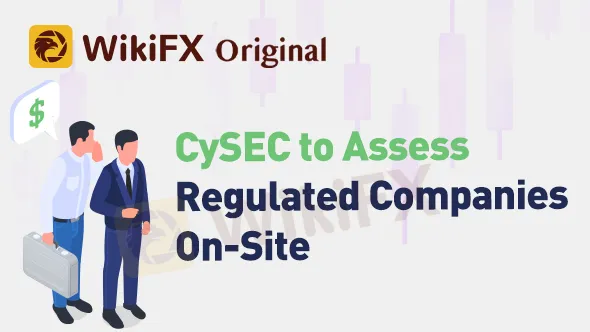简体中文
繁體中文
English
Pусский
日本語
ภาษาไทย
Tiếng Việt
Bahasa Indonesia
Español
हिन्दी
Filippiiniläinen
Français
Deutsch
Português
Türkçe
한국어
العربية
CySEC to Assess Regulated Companies On-Site
Abstract:Cyprus Securities and Exchange (CySEC) announces plans for on-site assessments of regulated companies while warning the public about impersonators posing as regulatory officials. Also, do you know WikiFX also conducts field survey to verify brokers on-site? Read more to see how to assess this underrated feature of WikiFX!

Cyprus Securities and Exchange (CySEC) has recently revealed its intentions to conduct thorough assessments of regulated companies that provide investment services to retail clients. The evaluations, scheduled for the second half of 2023, will involve on-site visits and desk-based reviews targeting a sample of Cyprus Investment Firms (CIFs). The primary objective of this action is to evaluate how CIFs adhere to the marketing communication requirements outlined in MiFID II, ultimately bolstering investor protection as per ESMA's objectives.
CySEC's decision was prompted by the European Securities and Markets Authority's (ESMA) campaign, which seeks to examine the implementation of MiFID II disclosure rules concerning marketing communications across the European Union (EU). ESMA's review focuses on assessing the fairness, clarity, and absence of misleading information in marketing communications.
Furthermore, the evaluation encompasses marketing and advertising strategies employed by firms through various distribution channels, encompassing applications, websites, social media platforms, and partnerships with affiliates, including influencers. ESMA aims to gather insights into potential instances of “greenwashing” within marketing communications and advertisements.
ESMA is particularly concerned about the vulnerability of younger, less experienced investors who operate online, leading them to evaluate marketing practices in light of these risks.
Do you know that WikiFX regularly conducts field survey visits to broker companies to gather firsthand information about their authenticity. By physically visiting these companies, WikiFX aims to provide investors with accurate and reliable information regarding the credibility and reliability of brokers. The combination of WikiFX's field survey visits and CySEC's on-site evaluations collectively reinforces investor protection and contributes to the overall integrity of the forex market. These initiatives promote a safer and more trustworthy environment for retail clients, instilling confidence in the regulated companies they choose to engage with. Through these collaborative efforts, investors can have increased confidence in the regulated companies they engage with, fostering a more secure and reliable trading experience.
Follow the screenshots below to assess the results of WikiFXs global field visit surveys worldwide:
Type the broker‘s name into the search bar within WikiFX’s mobile application.

Click on the field survey column on the selected brokers profile page to see the full result.




In addition to the regulatory evaluations, CySEC has also issued a warning addressing the alarming rise in cases of individuals impersonating regulatory officers and representatives.

This recent cautionary announcement joins a series of similar warnings issued by the Cypriot regulator. In a prior incident from November of the previous year, the regulator identified instances where individuals and fraudulent websites impersonated CySEC officers, representatives, and even the official website.
The current focus of concern revolves around imposters attempting to solicit fees from victims by promising to settle counterfeit compensation claims related to firms under CySEC supervision. Fraudsters assume the guise of CySEC officers and appointed representatives, contacting potential victims via email and telephone, often using persuasive phone numbers, names, and even official stamps. These scammers target clients of CySEC-regulated entities, deceiving them with false promises of assistance in obtaining compensation and unlawfully acquiring additional personal information.

Disclaimer:
The views in this article only represent the author's personal views, and do not constitute investment advice on this platform. This platform does not guarantee the accuracy, completeness and timeliness of the information in the article, and will not be liable for any loss caused by the use of or reliance on the information in the article.
Read more

The Hidden Checklist: Five Unconventional Steps to Vet Your Broker
Forex broker scams continue to evolve, employing new tactics to appear credible and mislead unsuspecting traders. Identifying these fraudulent schemes requires vigilance and strategies beyond the usual advice. Here are five effective methods to help traders assess the legitimacy of a forex broker and avoid potential pitfalls.

Doo Financial Obtains Licenses in BVI and Cayman Islands
Doo Financial, a subsidiary of Singapore-based Doo Group, has expanded its regulatory footprint by securing new offshore licenses from the British Virgin Islands Financial Services Commission (BVI FSC) and the Cayman Islands Monetary Authority (CIMA).

CFI’s New Initiative Aims to Promote Transparency in Trading
A new programme has been launched by CFI to address the growing need for transparency and awareness in online trading. Named “Trading Transparency+: Empowering Awareness and Clarity in Trading,” the initiative seeks to combat misinformation and equip individuals with resources to evaluate whether trading aligns with their financial goals and circumstances.

Malaysian-Thai Fraud Syndicate Dismantled, Millions in Losses Reported
The Royal Malaysia Police (PDRM) has received 26 reports concerning the Nicshare and CommonApps investment schemes, both linked to a major fraudulent syndicate led by a Malaysian citizen. The syndicate’s activities came to light following the arrest of its leader by Thai authorities on 16 December.
WikiFX Broker
Latest News
AIMS Broker Review
The Hidden Checklist: Five Unconventional Steps to Vet Your Broker
YAMARKETS' Jingle Bells Christmas Offer!
Why is there so much exposure against PrimeX Capital?
Russia to Fully Ban Crypto Mining in 10 Regions Starting January 1, 2025
MTrading’s 2025 "Welcome Bonus" is Here
Doo Financial Obtains Licenses in BVI and Cayman Islands
CFI’s New Initiative Aims to Promote Transparency in Trading
Currency Calculator


